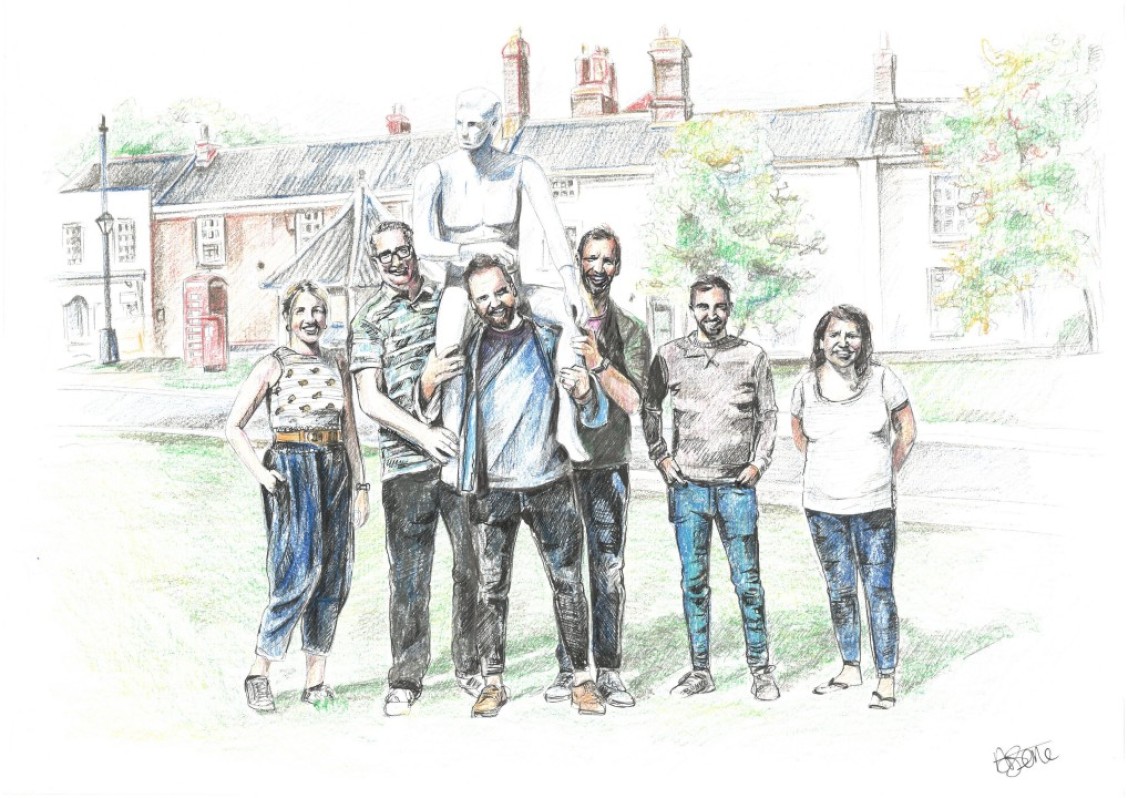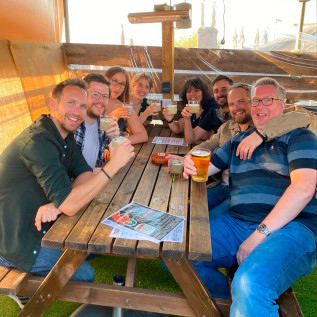
Branding
How branding helps to build a culture
By Dan Bradfield
24/02/21
This wonderful image was drawn for us by Alice Stone – as a thank you before leaving us for an incredible opportunity with a top London design agency
"Your culture is your brand"
Tony Hsieh, CEO Zappos.com
Wait, what does ‘culture’ mean?
Simply put, a culture is a set of behaviours, based on a set of beliefs. Beliefs are shaped by the things we read, see and hear - the experiences we have. Change the beliefs, you change the behaviours, you change the culture.
Here, we’re talking about the behaviours and experiences of internal teams and individuals in an organisation. Culture determines how people within an organisation treat one another and how they treat others who interact with that organisation, e.g customers.
Why is culture important?
Your culture will have a direct impact on your customer’s experience of your business, and that will determine how they feel about your brand. After all, your brand exists in the mind of your customer – so it’s up to you to continually make a good impression! Every employee can affect your brand, not just the front-line employees that are paid to engage with your customers.
A strong culture will create an understanding, a togetherness, a sense of ‘we’. It will encourage team members to flag up when another team member is behaving ‘out of culture’. A sense of shared belief will create a more consistent and positive experience for your customer, leading to better loyalty and advocacy.
In some businesses culture is so important, it becomes an interview in itself.
Back to our friend, Tony Hsieh at Zappos.com;
“At Zappos, we actually do two different sets of interviews. The hiring manager and his/her team will do the standard set of interviews looking for relevant experience, technical ability, fit within the team, etc. But then our HR department does a separate set of interviews looking purely for culture fit. Candidates have to pass both sets of interviews in order to be hired.
We believe that it’s really important to come up with core values that you can commit to. And by commit, we mean that you’re willing to hire and fire based on them. If you’re willing to do that, then you’re well on your way to building a company culture that is in line with the brand you want to build. You can let all of your employees be your brand ambassadors, not just the marketing or PR department. And they can be brand ambassadors both inside and outside the office.”
Culture-fit is not just sought by employers either. It works both ways.
How do you attract the best talent to your business?
Offering whopping great salaries and company cars is not necessarily sustainable, or the best way to motivate your talent. More and more prospective employees are concerned with the culture of the organisation of which they are looking to become a part of. Flexibility and work/life balance, green and sustainability credentials and of course the ethics of the brand are highly valued.
What are the challenges of culture in business?
As a business grows or as personnel change, one of the key challenges is continuing to communicate the purpose, beliefs and ‘raison d'être’.
In its infancy, a business is often built on the ideas and vision of a few select individuals who head up a relatively simple structure. In those early days there is a strong sense of what lies at the heart of your brand, and this naturally builds a strong culture amongst a small team. As personnel grow and structures change this culture can become diluted.
How does branding play a part in establishing culture?
Branding is all about communicating the ‘DNA’ of the business. How and why the brand exists, what is it here to do and change. What the proposition is and why someone should choose this brand over another.
Do it well and people outside, and within, an organisation will have a good idea of exactly what it is your brand stands for. Through your brand your customers will have a good idea of what they expect from you. It’s up to you to make sure employees know what that means is expected of them.
Can getting Naked help?
Our process lets us unpick the DNA and establish core brand values. From here we develop brand communication – authentic ideas that everyone can believe in that in turn helps all employees to see themselves as a part of the brand. This is where culture starts to form.
Towards the end of the branding project there will often be a form of communication or workshop with internal teams to share the thinking and showcase the branding. It can be a formalised mission statement in a brand guidelines document, large prints of core values on office walls or a small desk token/gift with meaning behind it – there are many creative ways to reinforce beliefs in an organisation.
Final thoughts
Establish your values, communicate them, hire according to them and live them, don’t just say them. That’s when brand culture becomes more than just a poster on the wall.
Beliefs lead to behaviours. Behaviours lead to culture. Culture impacts on brand reputation. Brand reputation impacts on sales.
So why is branding important?
Branding helps to create a strong and positive company culture. Improving the motivation, wellbeing, behaviour and productivity of employees. Leading to a better experience for your customers and better brand reputation.
















